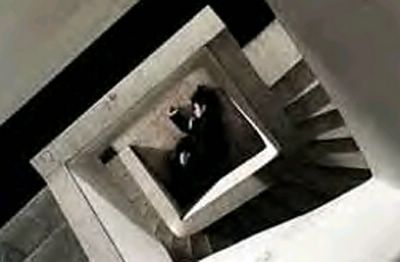
FILM/Festivals/Brussels
Brussels International Festival of Fantastic Film
March 11-26
Something wicked this way comes -- the Brussels International Festival of Fantastic Film.
The nearly month-long festival is a mecca for fans of the dark, odd and unusual, and there’s a film line-up to suit every palate: sci-fi, anime, psychological thriller, campy horror, and films which can only be classified as indefinable.
This year, the festival features feature-length and short films, but adds an anime series (Mar. 19, 20), and a few more offbeat touches, like the Body Painting (Mar. 12) contest, and the Vampire Ball (Mar. 26. At midnight. Of course.)
Then there are the random art exhibits. This year features works by Jean-Paul Baibay, who grew up seemingly keyed into a universe of virtual realities which seemed more attractive to him than daily life. His childhood friends were the mildly deranged geniuses of the Belgian comic-strip such as the Count of Champignacc, Doctor Septimus and Professor Sunflower.
Lastly, the festival organizers have thoughtfully invited theatre acts La Compagnie Tultétar, Magic Land Theatre, Lionel Lê “Akuma” and Kuriakin’s Freaks Show to distract folks when it gets too boring waiting on queue to snatch tickets for sold-out screenings.
Highlights: Feature Films
“Abnormal Beauty”
Jiney relates to the world through her photography. Her work is met with admiration and acclaim, which leaves her cold and indifferent.
One day, she witnesses a fatal car crash and, torn between revulsion and fascination, snaps a shot of a dead pedestrian.
This morbid shot awakens latent emotion and excitement inside Jiney. She becomes increasingly obsessed with death, snapping shots of suicides and hiring butchers to slaughter animals on camera. When her fixation threatens to overwhelm her, she withdraws, trying to extinguish her obsession.
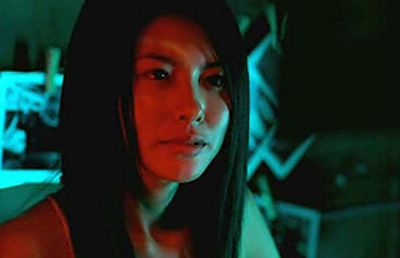
All seems well until someone anonymously leaves a package of photographs and a video for Jiney -- photos and film that appear to be an actual killing planned and caught on camera especially for her.
The Pang brothers (“The Eye,” “The Tesseract”) are at it again. “Abnormal Beauty” is a chilling tale of extreme obsession, full of gorgeous and disturbing images, edited with punch and style.
“Appleseed”
The year is 2131 and Deunan Knute, a hi-tech fighting machine, roams the scorched earth of a planet ravaged by war. With her communication lines severed, she’s unaware that the fighting ended long ago, until she’s ambushed by former lover Briareos. Nearly killed in battle, Briareos has been reconstructed as a cyborg.

He needs her help, but his mission is a mystery. He travels with her to the gleaming metropolis of Olympus, where he now lives with the servile Hitomi. Beneath the apparent calm surface of Olympus, Deunan discovers something disturbing about Hitomi and the denizens of the city.
Conspiracy is rife, powerful forces are preparing for battle, and Deunan is the only one who can stop the coming Armageddon.
Based on the popular manga by Masamune Shirow, whose work has been adapted by Mamoru Oshii (“Ghost in the Shell”, “Innocence”), “Appleseed” is an high-impact dose of cyberpunk anime.
“Arahan”
Sang Hwan is a bumbling cop who gets beaten up regularly by the local gangsters. One day, he finds himself on the wrong end of a showdown between a bag snatcher and a seemingly superhuman convenience store clerk.
Eui-jun, the gorgeous register jockey in question, knocks Sang Hwan out flat. When he wakes up, he's covered in thousands of acupuncture needles and surrounded by five doddering old people who keep talking about his incredible ch'i. This mystical force, when unlocked, can turn a normal human into a superhuman.

They call themselves the Seven Masters, and they've got a major crisis on their hands. Heung Un, the Master of Absolute Evil, has freed himself from the prison in which the Seven Masters had sealed him in and the inept Sang Hwan is the only one who can prevent Heung Un from plunging the world into chaos.
With “Arahan,” director Seung-wan Ryoo crafts a stylish, funny and spectacular urban martial arts fantasy.
“Les Revenants”
It’s the middle of the day in a small provincial French city. An army of the living dead pour out of the municipal cemetery and invade the town center. They look no more fearsome than a stream of middle class Sunday strollers dressed in casual sweaters.
All over the world, millions of the recently deceased have risen from their graves. The city council is soon freaking out over the enormous logistical problems of providing shelter for these returnees from beyond. And as for their families, well, there are some macabre homecomings in the offing.
“Les Revenants” is not your average zombie film. Terror, gore and F/X are replaced by existential consideration.
What if the dead really rose from their graves to cohabit with the living? Director Robin Campillo directs a thoughtful drama with considerable visual flair and subtle camerawork. By confronting his characters with their deadly beloved, Campillo forces us to come to terms with our own failings as living human beings.
“Alive”
In an act of revenge, Tenshu Yashiro brutally murders the men responsible for his girlfriend Misako’s rape. He is sentenced to death, but after a failed execution, Tenshu gets another chance.
He awakens to find himself in a sealed room with another “lucky” survivor, the psychopathic Gondoh. The two men are now part of a secret government experiment.
A team of scientists watches via camera as a power struggle unfolds between the prisoners and The Displacer, a parasite that eats away at its host’s soul until nothing remains but a machine of flesh bent on destruction.
”Alive” marks the return of Japan’s action cinema maestro, Ryuhei Kitamura. He has traded the horror of the undead for an inventive science fiction setting that builds to a shattering finish.
“Blood Red/Rojo Sangre”
Once-famous actor Pablo Thevenet is having a hard time finding work. He endures humiliating casting sessions by young directors who’ve never heard of him and by veterans who’ve forgotten him.
Then his luck turns.Wealthy and eccentric Mr. Reficul engages him to play a living statue in front of his fashionable night club. The job doesn’t amount to much, but it pays well. So well, in fact, that Pablo now has the freedom to start eliminating the empty-headed good-for-nothings who've stolen his place in the limelight.
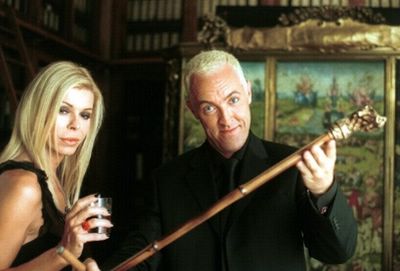
Impersonating the most infamous human monsters like Gilles de Rais and Jack the Ripper, Pablo starts thinning out the ranks of the unjustly famous. Strangely, he seems to be getting away with it, as if an unknown benefactor is watching over him...
Debut director Christian Molina treats us to a ghastly variation on Goethe’s “Faust.” He has given his slow paced and atmospheric horror film a unique look with ingenious camerawork, creative transitions between the scenes and very effective F/X. Cult actor-director Paul Naschy (“Night of the Werewolf”) is brilliant as the narcissistic and deluded Pablo Thevenet.
“Hotel”
Irene is hired as a receptionist in an isolated, virtually inaccessible hotel in the Austrian Alps. The humorless proprietor is fanatically obsessed with cleanliness and order. The other employees are equally odd, remote and strangely reticent.
Irene is replacing Eva, a girl who has disappeared without a trace. Irene slowly learns that the area has a reputation as a place where people go missing. At night, the surrounding woods call out to her, issuing an invitation to enter a deserted grove...Note to Irene: Run. Like. Hell.

“Hotel,” the second feature by Austrian director Jessica Hausner (“Lovely Rita”) is a disturbing, psychological chiller reminiscent of the work of Stanley Kubrick, Alfred Hitchcock and even the Brothers Grimm. Hausner combines supernatural elements from fairy tales and German mythology in this atmospheric, otherworldly tale. The superb cinematography is complemented by an effective sound design that animates the hotel with an eerie, breathing presence.
“Kamikaze Girls”
Lonely dreamer Momoko finds herself stuck in the paddy fields of rural Ibaraki prefecture when her petty criminal of a father has to skip town after his latest scam goes wrong. She yearns to escape back into the opulent world of the 18th century court of Versailles.
Unlikely salvation arrives in the form of foul-mouthed Ichiko, a member of the notorious girls-only biker pack, The Ponytails. Asses are kicked and garments embroidered as the two outsiders strike up an unusual friendship that will transform their lives.

“The nail that sticks out, gets hammered down,” as a Japanese saying goes. Anything but true for Momoko and Ichiko, played by Kyoko Fukada and Anna Tsuchiya, in the loopy pop-cultural extravaganza that is “Kamikaze Girls.”
With vibrant colors, infectious humor and sharp editing, director Tetsuya Nakashima recreates the bubblegum world of the “shojo manga,” or girl’s comic strip. Think “Amélie” remade by Takashi Miike and Quentin Tarantino.
“Nina”
“Nina” is an contemporary retelling of Dostoevsky’s "Crime and Punishment," set in the concrete jungle of São Paolo.
Nina is a struggling comic artist, who rents a room from Eulalia. When Nina loses her job and falls behind on the rent, Eulalia begins a sadistic power game with the young artist, including labeling every piece of food in the freezer.
Nina scrambles for money, selling her underwear to a sexual pervert and stealing the wallet of a blind one-night stand. Under the relentless pressure, Nina withdraws into her art, and her destructive impulses can no longer be stopped; she plunges into a violent fantasy world of her own devising.
“Nina,” the feature film debut of director Heitor Dhalia, is a refreshing piece of modern Brazilian cinema. Nina’s downhill ride into a nightmarish universe is filled with both comic absurdity and horror, portrayed with style and originality by Dhalia. Manga-like cartoon pop-ups, gloomy production design and a pulsating techno soundtrack complete this chilling tale of contemporary urban isolation.
“The Promise/La Promesa”
A dead marriage and an irrational attachment to religion constitute the tormented life of Gregoria. Nevertheless, a chance encounter with a man who has narrowly escaped death offers her a way out. His words, filled with hope, give her the courage to change her destiny.
After a last violent encounter with her husband, Gregoria flees to northern Spain and assumes a new identity. Now called Celia, she works as a nanny to the only son of a rich family. Rumors about the house and inexplicable appearances gradually invade Celia’s world.
Tormented by ghosts and her own paranoia, she resolves to protect the boy. What she doesn’t realize it that the true danger doesn’t lie in those around here, but in herself. Carmen Maura (“Women on the Verge of a Nervous Breakdown”) gives a powerful performance as a woman falling prey to her religious psychosis.
“The Vanity Serum/Il Siero Della Vanita”
When a number of TV personalities start to disappear, Inspector Lucia Allasco takes on the case, along with her colleague Franco Berardi. As the investigation progresses, the officers suspect there’s a connection between the disappearances and powerful TV talk show host, Sonia Norton.
As they dig deeper into the case, Allasco and Berardi dredge up a world where appearance is more important than life itself, and even the meekest person can become a ruthless killer.
Director Alex Infascelli runs the risk of becoming a BIFFF regular. After surprising audiences with original serial killer flick “Almost Blue” in 2002, he now presents a blood-soaked attack on that monumental temple of bad taste, vulgarity and sensationalism; talk show television. “The Vanity Serum” is based on a novel by Niccolo Ammaniti.
“Audition”
Video company executive Shigeharu Aoyama, who lost his wife seven years earlier, is trying to find a replacement.
A colleague suggests that they fake auditions for the female lead in a non-existent film, which will allow them to pick out potential brides from the actresses who answer their ad.
Only one candidate stands out; Asami, a 24-year old former ballerina who only wears white. Her docility and air of subservience are exactly the qualities Aoyama finds attractive in a woman, and it seems like a match made in heaven.

At first, he can’t believe his luck in finding this soft-voiced beauty. Then he notices weird scars on her legs and starts hearing strange stories about people who have met Asami, then disappeared. His perfect plan starts to unravel, as Asami’s hidden rage begins to reveal itself.
The central theme of the movie is the deleterious effect on women of male sexual attitudes and assumptions. ”Audition” is a powerful and graphic horror film, made even more disturbing by the haunting beauty of its images.
“Trauma”
Ben wakes up from a coma to discover that his wife, Elisa, died in the same accident that nearly killed him.
He tries to rebuild his life by getting a new job and moving to a new apartment, where he befriends his attractive neighbor, Charlotte.
But his mind starts playing tricks on him. Someone is moving things around in his apartment and methodically destroying his possessions. Then he suddenly begins to see his dead wife everywhere.
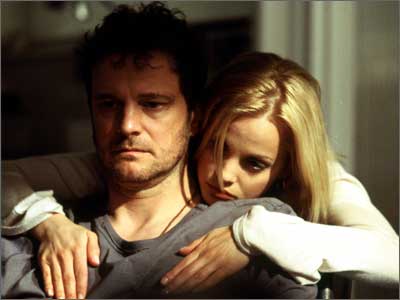
Fearing that he’s going crazy, he visits a childhood therapist. Charlotte, however, takes him to see a psychic, who tells him that she senses his wife is still alive.
Then the police pay him a visit. They tell him that he’s under investigation – for murder.
Director Mark Evans (“Resurrection Man”) delivers a gripping, psychological thriller with Hitchcockian twists. Elliptical editing and menacing sound design is deployed to create an angst-written canvas, as we watch the main character treading a razor-thin line between grief and self-delusion.
“Spider Forest”
Min loses his wife in a plane crash, a tragedy he foresaw in a dream shortly before it occurred. Tormented by grief and unable to forget his beloved, Min trudges through his existence with no apparent will to live.
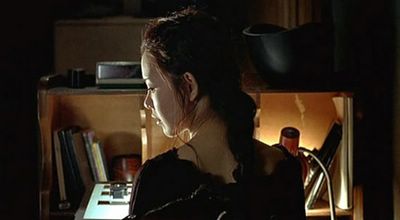
He leaves his job at a TV station, and loses entire days drowning his misery in alcoholic binges. Then he meets Soo-young, an anchorwoman who lost her father in the same terrible accident that killed Min’s wife. Over time, the memory of the tragic crash is slowly replaced by the desire to start a new life with Soo-young.
Then Min starts receiving mysterious phone calls that lead him to a remote cottage hidden in an ancient forest -- a cottage Soo-young appears to know very well.
After his feature debut, “Flower Island”, in 2001, director Il-gon Song creates an engaging psychological mystery thriller, with “Spider Forest.”
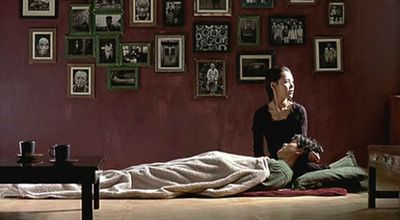
The movie was inspired by a folk legend that warns of forgotten spirits that are turned into spiders and trapped in a forest until they are once more remembered by the living.
Song defies genre boundaries, as the film moves between detective story, supernatural thriller and subtle psychological drama, luring the audience into a deftly constructed web of eerie storytelling.
Highlights: Short Films
“Love Story in B-minor”
Film noir is not always film noir.
“La Peau du Loup/Skin of the Wolf”
Little Red Riding Hood is actually called Virginie, who has to think quick, as she’s pursued by Italian werewolves.
“Hell Bent for Whiskey”
Chicago, 1928. Gang wars, prohibition and some very deadly whiskey.
“The Strange Portrait of the Glass Lady”/Hélène Cattet and Bruno Forzani
The last moments of a woman, seen through a shard of glass.
Find it: Rue de la Comtesse de Flandre, 8
Gravin van Vlaanderenstraat, 8
B-1020 Brussels - Belgium
Get info: + 32 [0] 2-201-17-13
Shown/header image: "Nina"
Find film festivals in other cities, in the FEB/MAR issue of "Arte Six."

<< Home